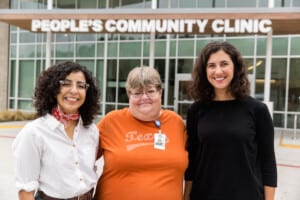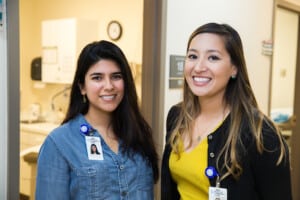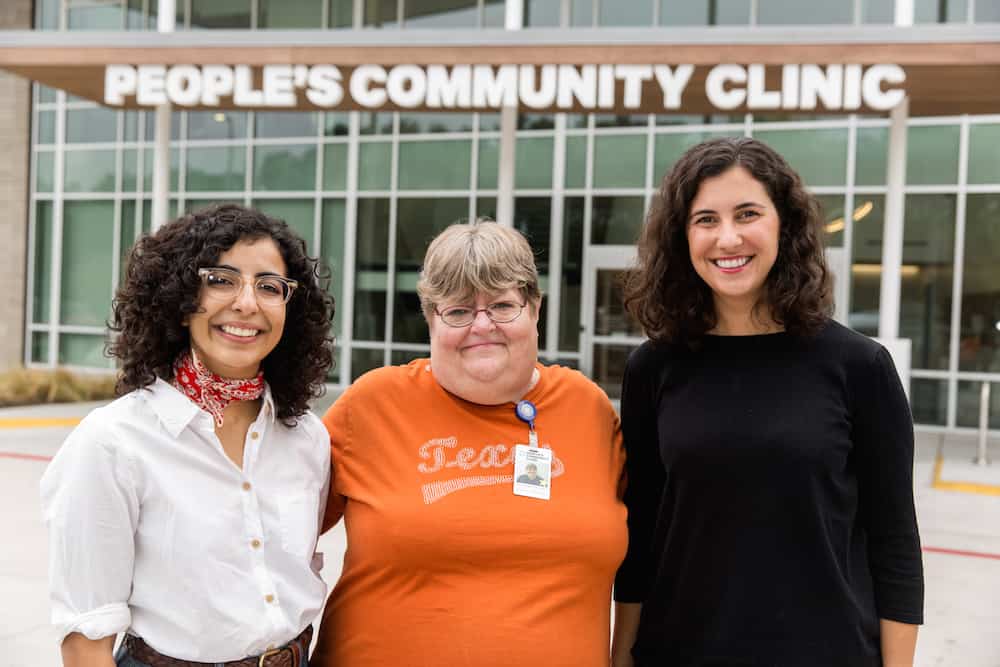Social work graduates fill behavioral health specialist positions in People’s Community Clinic
Robin Rosell (MSSW ’82) was puzzled when she applied for her current job, twenty years ago.
“It just said ‘adolescent social work,’ it didn’t’ even say where the job was! When I heard it was at People’s I was kind of excited. The dad of one of my best friends when I was growing up was a minister, and I knew he had helped start the clinic in the basement of his church, off the main drag,” she remembers.
Rosell refers to People’s Community Clinic—known simply as “People’s” by many Austinites—which started as an all-volunteer, free clinic in 1970 in the basement of the Congregational Church on Guadalupe Street, across the UT Austin campus.
As Rosell sees it, the clinic was part of the hippie movement in Austin at the time:

“Doctors and nurses volunteered their service, and there were also social work students doing internships there. I think its beginning as an all-volunteer, free clinic still influences People’s to this day, which is probably one of the reasons why I’ve worked here for 20 years! It’s a very progressive place that provides holistic care.”
This holistic-care approach was reflected in an integrated behavioral health program, which People’s formalized in 2006 with funding from the Hogg Foundation for Mental Health.
Behavioral health encompasses behavioral factors—such as the foods we eat and the lifestyle we have— that are related to chronic illnesses as well as mental health and substance use conditions and diagnoses. In integrated behavioral health settings, behavioral health providers and medical providers work together to take care of the patient in a holistic way—body and mind.
Rosell, who started in the mid-1990s as the clinic’s sole social worker, now supervises a team of eight behavioral health specialists. They work closely with the medical staff at the clinic’s two locations to identify and serve patients experiencing depression and anxiety, and to provide case and medication management.
Four members in Rosell’s team received their master’s from the School of Social Work with a specialized training in behavioral health. They are Griselda Onofre (MSSW ’15), Evelyn Marquez (MSSW ’15), Carrie Torn (MSSW ’16), and Marianela Guzmán (MSSW ’16).
As part of their specialized training, the four of them completed their internships in healthcare settings, took an inter-professional course with students from nursing and pharmacy, and took another course on Motivational Interviewing—a well known evidence-based behavioral intervention.

“They are so perfectly trained for this kind of setting. Integrated care didn’t even exist when I was going through school, so I really appreciate the skills they come with,” Rosell says.
For the social work graduates, People’s provide an ideal work environment.
“I really appreciate that mental health is integrated at People’s. Many times clinics are good at taking care of the physical body without realizing how important mental health is. Here we emphasize mental health and the environment where the client is, and that it’s really important to help people move forward,” says Marianela Guzmán, who is at the clinic’s Center for Women’s Health.
Carrie Torn works at the main clinic, which People’s opened earlier this year in North Austin. The gleaming modern building was designed with integrated care in mind. The patient exam rooms surround an open space where interprofessional care team members can interact easily.
“It’s really an open flow space where we, as providers from different disciplines, are interacting with each other. I’m available for on-site consults, where I might be screening for behavioral health needs or referring patients to services,” Torn says.
Since the main clinic opened earlier this year, the behavioral health tem has doubled in size. Evelyn Marquez, also at this location, does mostly one-on-one counseling. As her fellow graduates, Marquez is bilingual in Spanish, which is an essential skill at People’s.
“We see mostly Hispanic clients, that’s our largest client population, and many are monolingual. And although I have patients who are bilingual, sometimes they need to turn to a Spanish word to best describe their feelings. I think it’s really comforting to patients to be able to do that with us,” Marquez says.
Many clients come to People’s with significant histories of trauma.
“Anywhere between 85 to 90 percent of the cases involve some horrendous history of trauma that clients have experienced in their countries of origin, on their way here, or even while here. This trauma has effects on both their physical and mental health. There is also secondary trauma to our staff, so I’m trying to build as much support as I can for them,” Rosell says.
Despite the challenges, working with Latinos and mental health in an integrated clinical setting is rewarding.
“I love what I’m doing! Serving the Latino community, especially as a Latina and a woman myself, I love serving in this capacity,” says Griselda Onofre.
Onofre does mostly one-on-one counseling at the clinic’s Center for Women’s Health, and many of her clients are expecting mothers.
“I might be younger than some of the woman who come here and I do not have children,” she adds. “But at the same time I see that look in their eyes, like they are saying ‘this person is one of us, she understands me, and she is here to help me.’ I enjoy every single moment of it!”
By Andrea Campetella. Posted December 8, 2016.


